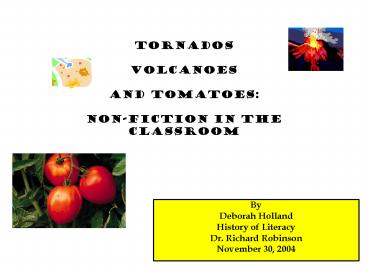Tornados Volcanoes and Tomatoes: NonFiction in the classroom
1 / 10
Title:
Tornados Volcanoes and Tomatoes: NonFiction in the classroom
Description:
'For me, the purpose of education is to enhance understanding. ... Hoot by Carl Hiaasen, a Newbery Honor book and a Mark Twain Award Nominee. ... –
Number of Views:45
Avg rating:3.0/5.0
Title: Tornados Volcanoes and Tomatoes: NonFiction in the classroom
1
TornadosVolcanoesand Tomatoes Non-Fiction
in the classroom
- By
- Deborah Holland
- History of Literacy
- Dr. Richard Robinson
- November 30, 2004
2
What is the purpose of education?
- Please take a moment and jot down your
- thoughts on the back of the handout.
3
Dr. Harold Gardner believes
- For me, the purpose of education is to enhance
understanding.
4
I believe that the primary purpose in teaching is
to help children learn.
- One of the best ways to help children learn about
a new topic is to let them choose to study topics
of interest to them. - Students should also be encouraged to keep a
notebook or list of topics of interest to them.
5
Stephanie Harvey, in Non-Fiction Matters,
suggests students make a list of
- What do I enjoy?
- What do I know about?
- What do I want to know about?
6
Take a moment to make a list of topics of
interest to you.
- I have many interests, including
- Knitting
- Crafts
- Painting
- Swimming and Tennis
- Listening to music
- Reading
- Writing
- CHICKENS!
- Birds of all kinds
7
From your list, you can find a topic that you
want to explore in greater detail.
- In my case, I choose to find out more about
burrowing owls, because I recently finished
reading Hoot by Carl Hiaasen, a Newbery Honor
book and a Mark Twain Award Nominee. Burrowing
owls are on the endangered species list but I
didnt know they existed until this book made me
aware of them.
8
According to William Zinsser,
- Motivation is at the heart of writinggo where
your interest lies or your affection or your
passion.
9
Therefore
- Conducting research on a topic of interest should
enhance student motivation, learning and
understanding.
10
What we want to see is the child in pursuit of
knowledge, and not knowledge in pursuit of the
child.George Bernard shaw
- Keep Reading/Keep Learning/Keep Growing































